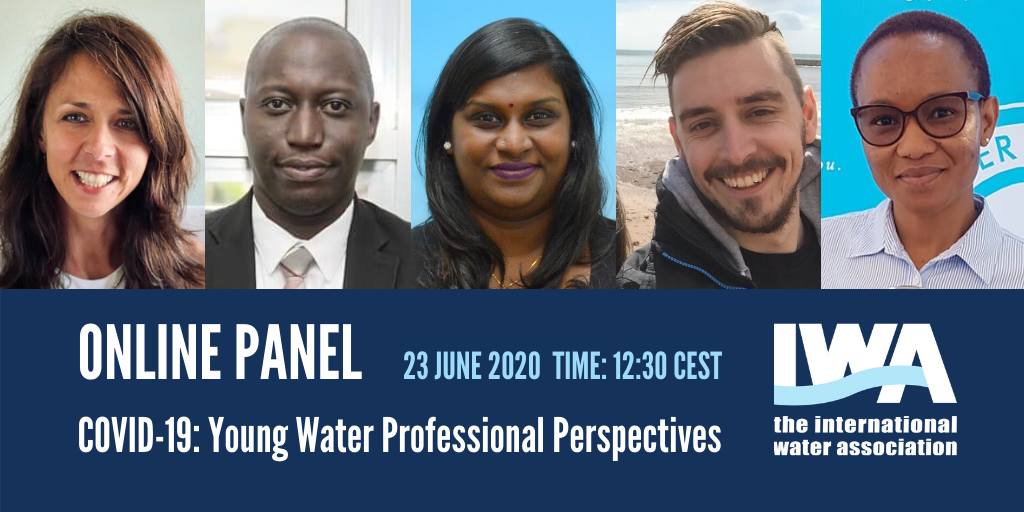COVID-19: Brings new impulses to utilities
Water and wastewater utilities provide essential services – the good management of these resources saves lives. This global health crisis has put a special spotlight on water utilities and they are managing the crisis with innovative solutions and high ethical standards. The post-pandemic outlook is positive, with the lessons learned in constant development during these extraordinarily challenging times, as discussed during the Online Panel discussion COVID-19: Young Water Professional Perspectives.
The COVID-19 pandemic has shed light on the fact that regular and thorough hand-washing, as advised by the World Health Organization (WHO), is an effective protective measure. Young Water Professionals working for utilities are the practitioners who witness the challenge of effective and safe management of this precious resource. They shared their perspective and experience in this IWA Online Panel and agreed that countries and communities in all parts of the world have experienced the importance of safe water and sanitation management services for public health during this global health crisis, with the utilities being critical for these societies.
The Online Panel discussion featured international emerging water leaders – Botlhale Monametsi (Water Quality Specialist, WUB Botswana), Ben Thwaites (SA Water, Australia), Loga Veeraiah (SPAN Malaysia), and John Sekabira Fisher (NWSC, Uganda), and was chaired by Kirsten De Vette (IWA, The Netherlands).
During the discussion, the panelists agreed that facing this crisis, water utilities have focused on maintaining essential services while at the same time caring for the safety of their workers. This has been a challenge for all, and many utilities noted a significant reduction in industrial water consumption with a simultaneous increase in household water use, due to the fact that people stayed at home. As a result, many utilities faced a drop in revenue. It has been challenging for them that in the face of ethical standards and public safety, governments or regulators gave directives or orders to “not cut-off individuals”.
The first main concern in Botswana was to “ensure continuous supply, where you have the mandate to serve the entire nation – with some villages 300 km away from each other,” said Botlhale Monametsi. The utility collaborated with various stakeholders including the government, private companies, and the communities for increased resourcing during the COVID-19 lockdown situation. Collaboration and solidarity among these stakeholders was enormous – for instance, communities in the area offered their own private boreholes as a supply source to the utility to ensure water services for the region.
The implications of the no-cut-off policy and similar directives were difficult for NWSC in Uganda, stated John Sekabira Fisher, as the collection rate for bills dropped immediately by 20%. To boost the needed revenue collection, NWSC applied a proactive marketing and communication approach to inform customers about the critical situation and to ensure timely payment of their bills. To reach out to their customers, the utility wrote messages in newspapers, radio stations, and social media to improve transparency and to raise awareness on the importance of customer payment.
In Malaysia, the announcement of the no-cut-off directive enabled the regulator, Malaysia’s National Water Services Commission, to give directives on the allowed number of the workforce and staff members at treatment plants and in offices, said Loga Veeraiahalso from SPAN. She added that the strict rules had an impact on the management of her utility, and led to a suspension of their thematic audits for the current year.
The panelists shared three key post-pandemic areas for attention:
The need to recover the financial hit of utilities – Loga Veeraiahalso explained that, “As a regulator, we have lowered the yearly KPIs and set up several proposals and plans to reduce the burden on service providers.” Meanwhile, Botlhale Monametsi, a water quality specialist at WUB in Botswana, indicated that, “Utilities should undertake Business Continuity Planning that takes pandemics and other emergencies into account. Technology, in our case that of collecting bills at a distance, is vital.”
The importance of communication and collaboration – Botlhale Monametsi highlighted “the importance of collaboration between utility, private sector, and community in light of addressing water scarcity”. John Sekabira Fisher commented that “[his] communication department has clearly shown its value, and the pandemic has shown the importance of communication in the crisis.” He further emphasised “the need for sharing of information, data, research findings both nationally and globally to learn from one another”.
The need for a constant supply and for increased water demand versus water availability – “There is a clear need for more work on constant supply and more water” said Ben Thwaites. “We need to work on new infrastructure and deal with greater water demand,” indicated John Sekabira Fisher.
Overall, the panelists were optimistic by the end of the Online Panel session. They see the future, post-pandemic water sector as potentially more innovative, geared towards automation, with a sound crisis management strategy, and engaged with its stakeholders.


